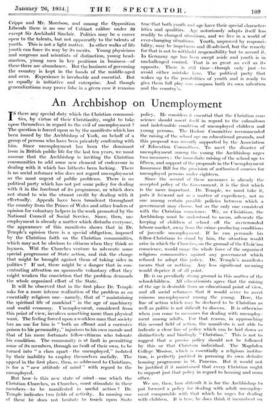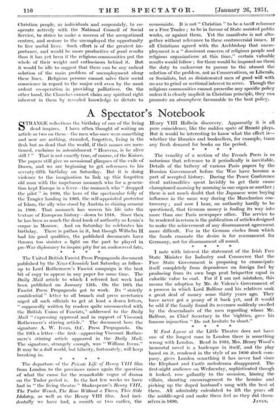. ,
An Archbishop on Unemployment I.S there any special duty which the Christian communi- ties, by Virtue of their Christianity,- ought to take • upon themselves in regard to the evil of unemployment ? The question is forced upon us by the manifesto which lias been issued by the Archbishop of York, on behalf of a group of -persons who.have been priVately conferring with hint. Since unemployment has been the dominant . issue in British public life for the last ten years, we must assume that the Archbishop is the Christian communities to add some new element of endeavour in dealing with it Which has hitherto been lacking. There is no social reformer who does not regard unemployment as the most urgent of public problems. There is no political party which has not put some policy for dealing with it in the forefront of its programme, or which does not stand to win the utmost credit by dealing with it effectually. -Appeals have been broadcast throughout the country from the Prince of Wales and other leaders of Opinion for voluntary helpers in the work promoted by the National Council of Social Service. Since, then, un- employment is already a matter which disturbs everyone, the appearance of this manifesto shows that in Dr. Temple's opinion there is a special obligation, imposed by the Christian faith on the Christian communities, which may not be obvious to citizens when they think as laymen. Will the Churches venture to -advocate some special programme of State action, and risk the charge that might' be brought against them of • taking sides in polities ? If not, there might be a danger that in con- centrating attention on spasmodic voluntary effort they- might weaken the conviction that the problem demands the whole organized effort of the State. ..
It will be observed that in the first place Dr. Temple asks for a more intense, realization Of the problem as an essentially, religious one—namely, that of " maintaining the spiritual life of mankind " in the age of machinery and world economy. Unemploynient, • considered from this point of view, involves something more than physical want. The feeling forced upon a workless man that society has no use:for hilly is " both an affront and a corrosive poison-to his-personality," injurious to his own morale and that of his more fortunate fellow-citizens who tolerate his condition. The community is at fault in permitting some of its members, through no fault of their own, to he turned into " a class apart—the unemployed," isolated by their inability to employ themselves usefully. . The appeal in the first place, then,. as addressed to Christians, is for a "-new attitude of mind " with regard to the unemployed.
But how -is this new state of mind—one which the Christian Churches, as Churches, must stimulate in their members—to be manifested in useful • action ?. Dr. Temple indicates two fields of activity.: In naming. one of these. -hi does not hesitate to toueli • upon State policy. He considers it essential that the Christian con- science should assert. itself in regard to the calamitous and indefensible eondition of unemployed children and young persons. The IladoW Committee recommended the raising of the school age on educational grounds, and this proposal was recently supported by the Association of Education Committees. To meet the disaster of unemployment among the young the Archbishop urges two measures : the immediate raising of the school age to fifteen, and support of the proposals in the Unemployment Insurance Bill for the provision of authorized courses for unemployed persons under eighteen.
Since the second or these measures is already the accepted policy of the Government, it is the first which is the more important. Dr. Temple, we must take it, puts it forward not as a matter of expediency, not as one among certain possible policies between which a government may 'choose, but as the only one consistent with the Christian conscience. We, as Christians, the Archbishop must be understood to mean, advocate the keeping of children at school --off the overcrowded labour market, away front the crime-producing conditions of juvenile unemployment. if be can persuade his fellow-Christians to stand by him, the situation would arise in which the ('lurches, on the ground of the Cluis':iati conscience, would range the whole force of the organized religious communities against any government which refused to adopt this policy. Dr. Temple's manifesto means that or nothing. Any less significant meaning would deprive it of all point.
He is on peculiarly strong ground in this matter of the schoolchildren. All educationists agree that the raising of the age is desirable from an educational point of view. and all social reformers that it would serve to avert ruinous unemployment among the young. Herr, the line of action which may be declared to be Christian as well as politic is not difficult to discern. It is otherwise when you come to measures for dealing with unemploy- ment among adults. For that reason, in approaching this second field of action, the manifesto is not able to indicate a clear line of policy which can be laid down as distinctively and bindingly " Christian." This is not to suggest • that a precise policy should not be followed by this or that Christian individual. The Magdalen College Mission, which is essentially a religious institu- tion, is perfectly justified in pursuing its own definite housing programme in St. Pancras. But it would not be justified if it maintained that every Christian ought to support just that policy in regard to housing and none other.
We see, then, how difficult it is for the Archbishop to put forward a policy for dealing with adult unemploy- ment comparable with that which he urges for dealing with children. It is true, he does think it incumbent on Christian people, as individuals and corporately, . to co; operate actively with the National Council of Social Service, to strive to make a success of the occupational centres, and restore to the unemployed the opportunity to live useful lives. Such effort is of the greatest im- portance, and would be more productive of good results than it has yet been if the religious communities put the whole of their weight and enthusiasm behind it. But it would be idle to suggest that there can be any radical solution of the main problem of unemployment along these lines. Religious persons cannot sake their social conscience in regard to the major evil even by the most ardent co-operation in providing palliatives. On the other hand, the Churches cannot claim any spiritual right inherent in them by revealed knowledge to dictate to economists. It is not " Christian " to be a. tariff reformer or a• Free -Trader ; to be in favour of State assisted public works, or against them. Yet the manifesto is not alto; gether without relevance to these controversial issues. If all Christians agreed with the Archbishop that unem- ploythent is a ." dominant concern :of religious people and religious organizations at this tine," certain valuable results would follow ; for there would be imposed on therii the duty to endeavour to pursue to the utmost the solution of the problem, not as Conservatives, or Liberals; or Socialists, but as disinterested men of good will with no Axe to grind or sectional interest to serve: - Though the religious communities cannot prescribe any specific policy unless it is clearly implicit in Christian principle, they can promote an atmosphere favourable. to the best policy.











































 Previous page
Previous page